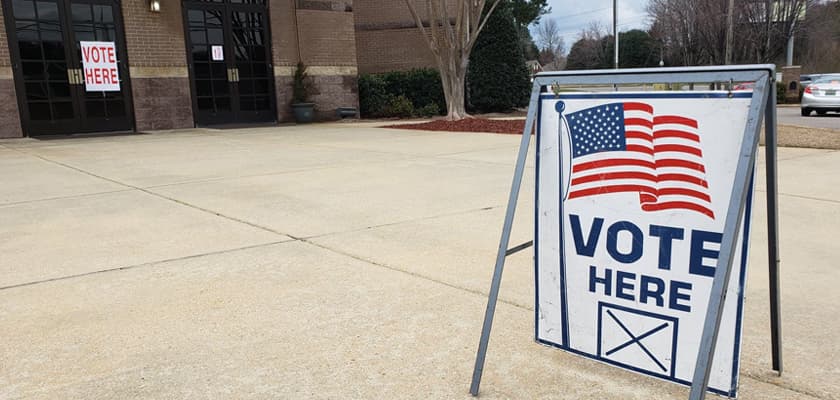The Republican and Democratic primary runoffs are on Tuesday and there are multiple offices on the ballot.
In the Republican primary runoff, former Business Council of Alabama (BCA) President and CEO Katie Boyd Britt faces Congressman Mo Brooks in the battle for U.S. Senate. The Republican nominee will face Democrat Dr. Will Boyd and Libertarian John Sophocleus in the Nov. 8 general election.
On the Democratic primary runoff ballot, two women are battling for the Democratic nomination in the governor's race. Yolanda Rochelle Flowers is in a heated battle with State Sen. Malika Sanders Fortier. The winner will be the first Black woman to receive the Democratic nomination for Governor in state history. She will then face popular incumbent Kay Ivey (R) and Libertarian Jimmy Blake on the Nov. 8 general election ballot. This will be the first time in state history that both major parties' gubernatorial nominees will be women.
2022 Primary Runoff Election Sample Ballots
There are also other statewide races on Tuesday’s ballot.
State Auditor Jim Zeigler and State Rep. Wes Allen (R-Troy)
State Rep. Andrew Sorrell and Dr. Stan Cooke are in a battle for the Republican nomination for State Auditor.
Florence Attorney Brent Woodall is challenging incumbent Jeremy Oden for Place One on the Alabama Public Service Commission on the Republican ballot.
Robert McCollum is challenging incumbent Chip Beeker for Place Two on the Alabama Public Service Commission, also on the Republican ballot.
In Alabama’s Fifth Congressional District, which Mo Brooks is vacating to run for Senate, there is a Republican primary battle between Madison County Commissioner Dale Strong and former Assistant Secretary of the Army Casey Wardynski.
In addition to the statewide races, a number of counties have State Representative and State Senate races to be decided in Tuesday’s runoff elections.
In State Senate District 12, Wendy Ghee Draper and Keith Kelley are in a battle for the Republican nomination.
In State Senate District 23, former State Sen. Hank Sanders is battling Robert L. Stewart for the Democratic nomination. Sanders is the father of Democratic gubernatorial candidate Malika Sanders-Fortier.
In State House District 2, Ben Harrison is in a runoff battle with Jason Spencer Black for the Republican nomination. Kimberly Butler missed making the runoff by five votes and is presently challenging the election with the Alabama Republican Party.
In State House District 4, Patrick Johnson is challenging incumbent Rep. Parker Duncan Moore on the Republican primary runoff ballot.
In State House District 14, Tom Fredricks is challenging incumbent Rep. Timothy (Tim) Wadsworth on the Republican ballot.
In State House District 20, James Lomax faces Frances Taylor for the Republican nomination.
In State House District 40, Julie Borelli faces Chad Robertson for the Republican nomination.
In State House District 55, Fred “Coach” Plump is challenging incumbent Rep. Roderick “Rod” Scott on the Democratic runoff ballot.
In State House District 56, Ontario Tillman faces Tereshia Huffman on the Democratic runoff ballot.
In State House District 57, Patrick Sellers faces Charles “Ray” Winston III on the Democratic runoff ballot.
In State House District 100, Mark Shirey and Peter Kupfer are squaring off for the Republican nomination.
There are also some runoffs for Republican and Democratic executive committee races as well as some county offices.
Remember that you must have a valid photo ID to vote in any Alabama election and that you must vote at the polling place which you have been assigned by your county board of registrars. You must already be a registered voter as Alabama does not have same-day voter registration. It is too late to turn in an absentee ballot by hand as the courthouses are closed on Monday in celebration of Juneteenth.
Polls will open promptly at 7 a.m. on Tuesday and close that night at 7 p.m. If you are already in line at the polls at 7 p.m. you will still be allowed to vote.
Remember that crossover voting is illegal in Alabama. You do not have to declare a party affiliation but if you voted in the Republican primary on May 24, it is illegal for you to vote in the Democratic primary runoff. Similarly, if you voted in the Democratic primary you cannot vote in the Republican primary runoff. Someone who did not vote in either the Democratic or Republican primaries may vote in the party runoff election of their choice. You are under no legal obligation to support the candidates or party you voted for in the runoff in the Nov. 8 general election.
To connect with the author of this story, or to comment, email brandon.moseley@1819News.com.
Don’t miss out! Subscribe to our newsletter and get our top stories every weekday morning.










